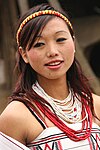Lotha Naga
| Total population | |
|---|---|
| 173,111 Baptist) | |
| Related ethnic groups | |
| other Naga Ethnic Groups |
The Lothas, also known as Kyongs are a major
.Origins
Scholars have presented several theories about the migration of the Lothas and the other Naga people, based on vocal explanations passed on from one generation to another.
Migration from eastern China
According to this theory mentioned by
Migration from Manchuria
This theory, mentioned by
Migration from Lenka
There are multiple versions of this theory:[4]
- The Lothas ancestors lived in a place called Lenka, situated east of the Naga territory (modern Nagaland). During the course of migration the Lothas split into two groups. The first group, after reaching the Brahmaputra Valley, settled there while the second group went towards the mountainous region of the present day Nagaland.
- The Lothas, Sumis have a common ancestor and had dwelled mutually as one in their past. But at some stage in their course of migration from Lenka, the Sangtams decided to go separate ways from a place called Mao.
- The Lothas, along with the other Naga ethnic groups, reached the present-day Kohima and settled at a place called Lezama. This is the place where the Semas parted with the other Naga ethnic groups and the Lothas with the Rengmas settled at a hill called Themoketsa (the Lothas called this place Honoyonton). Here the Rengmas parted ways from the Lothas. One group of Lothas went towards Doyang, passing through villages like Shaki and Phiro. The other group moved towards the hilly region of the present Wokha and settled at a place called Longchum near the Niroyo village.
Local traditions mention that the Rengmas and the Lothas were once part of a single ethnic groups.[5] There are also oral records of a mighty struggle between the combined Rengma villages, and the Lotha village of Phiro.[6]
Distribution
Towns and villages under Wokha District
- Yikhüm, Englan, Lakhüti, Pangti, Tsüngiki, Wokha, Riphyim Old, Riphyim New, Mekokla, Akük New, Akük Old, Aitepyong Town, Chankayan, Soku, Baghty, Baghty Town, Upper Baghty, Bhandari Town, Yimpang, Alikhüm, Longchüm, Yimparasa, Bhandari village, Yimza, Mongphio, Lishyüo, Yanmhon Old, Rüchan village, Koro, Pangtong, Serika A, Yanmhon New, Longayim, Lio Wokha Old, Seed Farm, Lisayan, Liphi, Mekirang, Suphayan, Serika B, Lio Wokha New, Merapani, Hayiyan, Lio Longidang, Changpang, Akahaqua, Tssori Old, Tssori New, Lichuyan, Mithehe, Changpang Hq, Longtsiri Village, Mungya, Nungying, Seluku, Koio, Chükitong Town, Longtsüng, Morakjo, Lotsü, Pyangsa, Moilan, Pyotchü, Sheru Echuk, Ralan Hq, Ralan Old, Ralan New, Woruku, Chandalashung Old, Chandalashung New, Chandalashung B, Yampha, Liphayan, Shoshan, S. Wochan, Yanlum, Tchutsaphen, Sanis, Sanis Town B (Jn), Sanis Town A, Sunglup, Yonchücho, Meshangpen, Tsopo, Chudi, Okotso, Süngro Town, Aree Old, Aree New, Longsa, Hümtso, Elümyo, Changsu Old, Changsu New, Niroyo Wokha, Longsachung, Okheyan Wokha, Yanthamo, Longla, Wokha, Yimkha Wokha, N Longidang, Pongidong, Vankhosung (Mission Compound), Nyiro Compound, Phiro, Shaki, Sankitong, Hanku, N. Longchum, Yankeli, Yanthung, Wozhüro EAC HQ.h
Other parts of Nagaland
Beyond Wokha District, there are also sizable Lotha inhabitants in Kohima, Chümoukedima, Dimapur and Medziphema.
Culture
Wokha District is the traditional home of the Lotha Nagas. The Lothas are renowned for their colorful dances and folk songs. The male members wear shawls indicating their social status. The prestigious social shawl for women is Opvüram and Longpensü for men.
Like many Nagas, the Lothas practiced headhunting in the older days. After the arrival of
Festivals
Tokhü Emong
Tokhü Emong is celebrated on 7 November. The Tokhü Emong is the harvest festival of the Lotha Nagas. It is celebrated in the 1st month of November every year and it stretches over to 9 days. Earlier, no particular date was fixed. However, in order to carve unity and uniformity among the ranges, Wokha elders decided to celebrate it on a fixed date. Following this Tokhü Emong is celebrated on 7 November, every year.
Notable people
- Zuboni Hümtsoe (1990–2017), Businessperson
- Mmhonlümo Kikon, Politician
- Dolly Kikon, anthropologist
- Silas Kikon (1956–2016), Singer
- James Kithan, Sportsperson
- Abraham Lotha, Anthropologist
- T. M. Lotha (1951/1952–2020) Politician
- Yanthungo Patton, Present Home and Deputy Chief Minister of Nagaland
- Khodao Yanthan (1923–2010), Naga Nationalist Leader
Gallery
-
A Lotha Naga girl in her traditional attire
References
- ^ "A-11 Individual Scheduled Tribe Primary Census Abstract Data and its Appendix". www.censusindia.gov.in. Office of the Registrar General & Census Commissioner, India. Retrieved 3 November 2017.
- ^ Hokishe Sema (former Governor), The Emergence of Nagaland
- ^ T. Phillips, Growth of Baptist Churches in Nagaland
- ^ J P Mills, The Lotha-Nagas
- OCLC 60616192.
- OCLC 44920051.


